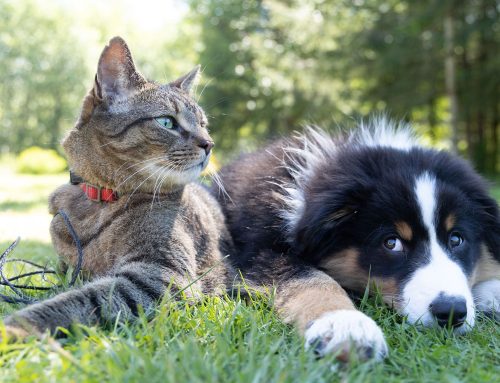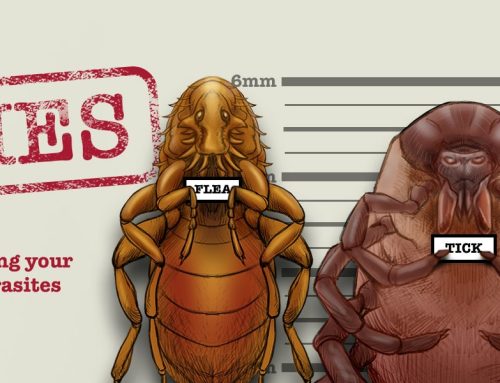Spring has sprung and now is the time to groom your pet to remove the remains of their winter coat! You should also watch for the hundreds of fleas and ticks that are organising their assault on your pets.
These nasty parasites are on the march now – and have you noticed that mosquitoes are all abuzz? They are ready to spread heartworm disease. Even flies and worms are set to worry your pets. But pounce on prevention and you can be done with the cure!
The hair of the dog
Have you been seeing tumbleweeds of cat and dog hair wafting over the floor lately? It’s a sign that you need to get into grooming to make your pet more comfortable and to prevent further fur balls making a mess in your house.
At present, you should be grooming your pets on a daily basis to remove their winter coat.
There is a fascinating range of products designed to make grooming easier. The KONG ZoomGroom is a nylon brush with large, soft tongs which gently strip the dead hair from your pet’s coat.
For long-haired pets or those with thick hair, now is a good time to have them professionally clipped. They will feel so much more comfortable after the removal of their hot coat of heat-trapping hair. Clipping will allow them to cool down much easier and will lessen the chance of heat stroke during the summer months. Ugly mats of hair that trap foreign bodies and that pinch your pet’s skin will also be removed.
An important thing to remember especially for all your long-haired fur babies is to check your pet daily for grass seeds, especially around the feet and ears, and search for ticks if you are in a tick-prone area.
Hop into flea control
Now that the warm weather is with us, the creeping, crawling, gnashing, nasty, nibbling, blood sucking, ferocious Aussie flea is on the prowl!
Thankfully, there is a large range of state-of-the-art flea control products available which are effective and safe. Note that certain products can be used on dogs and not cats.
Chewable treats and spot-on treatments are a popular way to treat fleas. Here at the Flemington Vet hospital we stock a variety of different treatment options with both topical and oral options to suit your fury friend. If your unsure what products your pet requires feel free to contact us at the Flemington Vet Hospital to have a chat.
Make mosquitoes buzz off
Mosquitoes spread heartworm disease and are much more prevalent in warm weather. Many pet owners incorrectly stop their pet’s heartworm preventive in the cooler months thinking that their pet is safe. This is not so.
If you have missed a dose of your pet’s heartworm preventive, contact your vet and ask for a heartworm test. If it shows that all is clear, place your pooch (and puss cat) onto a heartworm preventive medication such as, Advocate, Milbemax or Nexguard Spectra.
Many dog owners use a preventive heartworm injection available from vets because, while other alternatives are very effective, they are also very easy to forget.
Around worm control
Lastly, the beginning of a new season is always the best time to ensure your dog and cat have been wormed. Roundworms, hookworms and tapeworms are a problem for dogs and cats during the warmer months and dogs can also be infected with whipworms.
As a routine, adult pets should be wormed every three months. Look for an all-wormer medication, such as Popantel, Drontal, or Milbemax as this is likely to eliminate all types of intestinal worms your pets may have.
If your pet is on a monthly heartworm/intestinal worm combination, it may still be necessary to treat for tapeworms every three months (or 6 weeks in hydatid areas). Check the product label to see if your chosen product controls tapeworms.
Choosing the correct combination of parasite control preparations for your pet can be complex. So be sure to consult with your veterinarian for a parasite control solution that will keep your pets up to scratch.
Shed the winter kilos
Many pet owners think that a bit of extra weight is not a concern. However, overweight pets are predisposed to serious conditions including arthritis, pancreatitis, diabetes (especially with cats) and even cardiovascular disease. So, if you think your pet is overweight, it’s time to talk to your vet about a weight reduction program.





